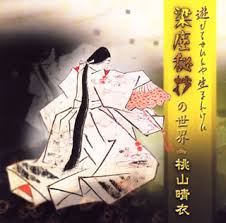Musician singer Momoyama Haru 桃山 晴 衣 died at age 69 on December 5. Player of the shamisen, she is best known for his 1981 album " Ryôjinhishô " 梁 尘 秘 抄, which resurrected the lyrics of popular songs of the 12th century, purely regarded as literary works so far, with original music composed by the hypothesis of pan-Eastern music, which crosses geographic band that goes from North African countries to Japan. It

was also able to give new life to other folk songs of Japan. She has performed with many musicians Oriental, including the Egyptian oud player Hamza El Din. She made the music The Tempest, directed by Peter Brooke. She has written books on traditional Japanese music. Her husband is TSUCHITORI Toshiyuki, percussionist.
Ryôjinhishô is the collection of anonymous poems published by Goshirakawa joko about 1180. Most words have inspired Buddhist, but they are not dogmatic, because they are the more or less naive faith of the people. The collection also contains erotic poems. Unfortunately, most of the poems are gone. Forgotten for several centuries, the collection was rediscovered in the early 20th century by the poet Nobutsuna SASAKI, also known as the scientist who established the critical edition of Man'yôshû . While joko ("Emperor retired) at the end of the aristocracy in the era of the advent of the samurai, was madly in love Goshirakawa popular songs of the era. There are several emperors who left a literary, but it is quite exceptional for its love of popular music.
The collection also contains musical references, but they are hardly readable, because the tradition is completely lost. Nobody dared to put these poems into music because of it, but Momoyama did with his original music. Desecration of medieval works? But no. Because the most famous words Ryôjinhishô are as follows:

was also able to give new life to other folk songs of Japan. She has performed with many musicians Oriental, including the Egyptian oud player Hamza El Din. She made the music The Tempest, directed by Peter Brooke. She has written books on traditional Japanese music. Her husband is TSUCHITORI Toshiyuki, percussionist.
Ryôjinhishô is the collection of anonymous poems published by Goshirakawa joko about 1180. Most words have inspired Buddhist, but they are not dogmatic, because they are the more or less naive faith of the people. The collection also contains erotic poems. Unfortunately, most of the poems are gone. Forgotten for several centuries, the collection was rediscovered in the early 20th century by the poet Nobutsuna SASAKI, also known as the scientist who established the critical edition of Man'yôshû . While joko ("Emperor retired) at the end of the aristocracy in the era of the advent of the samurai, was madly in love Goshirakawa popular songs of the era. There are several emperors who left a literary, but it is quite exceptional for its love of popular music.
The collection also contains musical references, but they are hardly readable, because the tradition is completely lost. Nobody dared to put these poems into music because of it, but Momoyama did with his original music. Desecration of medieval works? But no. Because the most famous words Ryôjinhishô are as follows:
遊び を せ むとや 生まれ けむ Maybe we born to play.The first verse 遊び を せ むとや 生まれ けむ ( Asobi-O-n-to-ken-ya umar ) was the original title of the album Momoyama. These two lines are my favorite quote of Japanese literature :-)
戯れ せ むとや 生まれ けむ Maybe are we born for fun.
0 comments:
Post a Comment